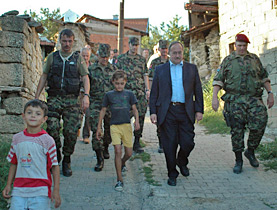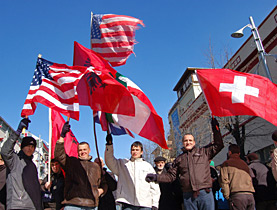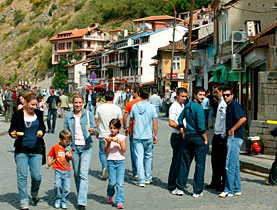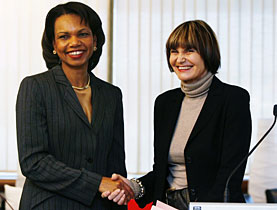Experts divided over Swiss soldiers in Kosovo

Kosovo's declaration of independence has restarted the debate in Switzerland about whether the Swisscoy military unit should continue its work in the region.
For some experts and politicians there are political and diplomatic reasons why Swisscoy should not remain in the former Serbian province, which proclaimed itself independent on Sunday.
Swisscoy, part of the multinational Kosovo force (Kfor), has been present in Kosovo since 1999. The unit’s 220 members are mostly stationed in Suva Reka and their main tasks are logistics, providing infantry, military police duties and air transport.
But not all experts agree with Swisscoy’s mandate. “With the unilateral declaration of independence there is no longer the full legal basis in international law for continuing the mission,” said Thomas Fleiner, director of the Institute of Federalism at Fribourg University.
“This is without taking into account that this unilateral declaration risks creating a dangerous precedent,” added the professor, who is an advisor to the Serbian government on Kosovo’s status.
Bosnian Serbs could also call for secession and then annexation to Serbia, he explained, and Croats in Bosnia could make similar demands.
“All this could destabilise the whole region. The secession phenomenon could also affect other regions: [South] Ossetia, Abkhazia, Moldova or in Africa and Asia,” said Fleiner.
Fleiner maintains that the United Nations resolution 1244 of 1999, which sets out broad autonomy for Kosovo while aiming to safeguard Serbian territorial integrity and providing justification for international troops, is the only valid legal basis.
Concerns have been raised by other experts that keeping Swisscoy in Kosovo could put Switzerland’s neutrality at risk.
Calls for withdrawal
The Green Party and the rightwing Swiss People’s Party have already called for Swisscoy’s mission to be ended. People’s Party parliamentarian J. Alexander Baumann says that the unit should be withdrawn immediately before the situation degenerates.
“Our presence in Kosovo no longer makes any sense and puts our international position in danger,” said Baumann.
Last year the government extended Swisscoy’s mandate until the end of 2011. It maintains that an independence declaration does not affect the UN resolution, as this retains its validity even if the context changes.
“The UN Security Council alone is able to annul this resolution,” explained Bruno Roesli, from the Directorate for Security Policy at the Swiss defence ministry.
“Only in this case or if the Security Council opted for a new resolution would government assess whether the legal conditions still existed for maintaining our soldiers in Kosovo,” he added.
Some in parliament, which has yet to approve the mandate extension, worry that violence will escalate in Kosovo. Swiss troops are forbidden by law to take part in conflicts.
Bretton Woods
The debate is not just a legal one. Serbia is one of the countries that Switzerland represents at the Bretton Woods institutions – The World Bank and the International Monetary Fund.
Recognition of Kosovo by the Swiss government – should this be announced – could annoy the Serbs, who in turn might withdraw from the group and weaken the Swiss position.
“The concern is legitimate,” said finance ministry spokeswoman Tanja Kocher. “However, we have an excellent relationship with Serbia. Belgrade is very satisfied with our work at the international monetary institutions. A defection by Serbia can therefore be excluded.”
It has been reported, however, that Finance Minister Hans-Rudolf Merz has criticised Foreign Minister Micheline Calmy-Rey for expressing a wish to recognise Kosovo. The government has yet to make a statement on the independence issue.
swissinfo, based on an Italian article by Paolo Bertossa
In 1999 the government decided to participate in the Kosovo force Kfor on the basis of the UN resolution 1244.
This was intended to be part of an entire package to address the acute problem of refugees and displaced persons, to ensure immediate aid in Kosovo and to help stabilise the region.
Parliament has limited the mandate until the end of 2008. The annual budget for 2006, 2007 and 2008 is SFr37.5 million (SFr34.2 million).
In December 2007, the government agreed to extend the Swisscoy mission until the end of 2011. Now it is up to parliament to give its approval. The decision will be made during the 2008 summer session.
It was announced on February 18 that around 190 members of the Swiss army had started their training for peacekeeping in Kosovo. The 18th Swisscoy contingent is expected to start duty on April 4.
The Swiss government is responsible for formally recognising Kosovo, but it will only do so once it has heard the opinions of the two parliamentary foreign affairs committees.
The Senate committee was expected to discuss the issue on February 21, and the House of Representatives committee the next day.
Theoretically the government does not have to give a statement before February 27, but it could do so, if necessary, at any time after February 22.

In compliance with the JTI standards
More: SWI swissinfo.ch certified by the Journalism Trust Initiative



You can find an overview of ongoing debates with our journalists here. Please join us!
If you want to start a conversation about a topic raised in this article or want to report factual errors, email us at english@swissinfo.ch.